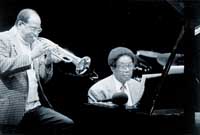
|
|
|
|
|
|
Photo Credit: Tim Owens |
Jimmy Owens
Good vibes and good music are in the air as trumpeter Jimmy Owens is on the set for Billy Taylor's Jazz at the Kennedy Center. Possessing a great sense of humor along with serious jazz chops, Owens is one of the more underrated artists in jazz. The warmth shared between host and guest is quite palpable on this edition of the show as Dr. Taylor introduces Owens as one of his "best friends." Blessed with an easy gift of gab similar to our host's, Owens is one guest who shows that he could easily sub for Dr. Taylor. Asked when he started playing the trumpet, Jimmy's detailed and humorous response leads into a natural introduction for a rendition of Dr. Taylor's "It's a Grand Night For Swinging." After founding the Jazzmobile program in New York, Dr. Taylor found that one of the most adept instructors in their education program was Owens. Recalling how he used to demonstrate the technique of circular breathing, Dr. Taylor sets the audience up for a hands-on display of sorts, encouraging them to try holding their breaths as long as Owens held a note. Owens' influences span the history of the jazz trumpet, though he professes that Miles Davis is at the center of that circle of influences. He tells the audience about a "wonderful" first encounter with the often daunting Miles. It seems the trumpet master spotted young Owens eyeing his horn and asked him to play something. After Owens whipped out his mouthpiece and played Miles horn, Miles got his band to play along with the youngster. Owens talks lovingly and warmly of Dizzy Gillespie, though he admits that when he was learning the horn, Dizzy's technique was too daunting for him to actually emulate. An inevitable influence, Louis Armstrong, yields a warm anecdote from Dr. Taylor's days as musical director of the David Frost show, with Owens in the trumpet section. On the show, Armstrong compliments Owens on his version of "Nobody Knows The Trouble I've Seen," rendered at a birthday tribute to "Pops." The audience question period garners a query from an arts educator who draws an impassioned response from Dr. Taylor on the issue of the diminishing degree of arts education available to our children. Dr. Taylor responds in part by citing the fact that children involved in arts education and activities are rarely trouble makers or youth at risk. The show's musical selections include a beautiful duet between Owens and Dr. Taylor on "Nobody Knows The Troubles I've Seen", and a Miles Davis-Dizzy Gillespie medley of "Walkin'" and "Woody 'n' You." Other literature from the jazz trumpet lineage comes from the pen of the late Kenny Dorham as Jimmy joins the trio for Dorham's classic "Blue Bossa." The closing musical selection is an apt illustration of Jimmy Owens' composing acumen as they perform a selection from the suite he was commissioned to write for the Martin Luther King Jr. school in New York, "Non-Violent Blues."
|
|
| |
This page and its contents Copyright© 2000 National Public Radio
